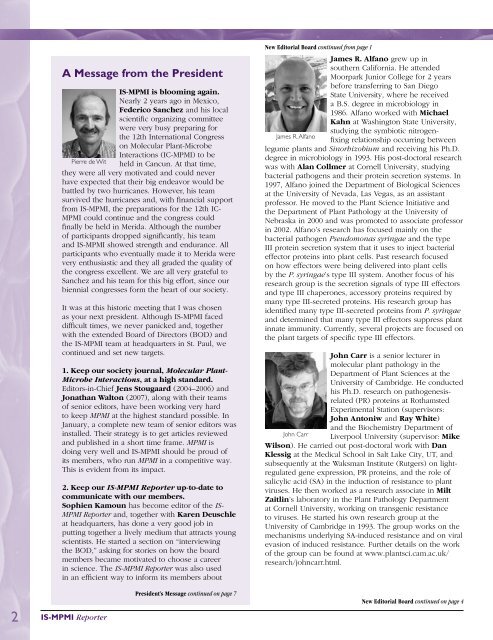IS-MPMI Reporter - International Society for Molecular Plant-Microbe ...
IS-MPMI Reporter - International Society for Molecular Plant-Microbe ...
IS-MPMI Reporter - International Society for Molecular Plant-Microbe ...
Create successful ePaper yourself
Turn your PDF publications into a flip-book with our unique Google optimized e-Paper software.
2<br />
A Message from the President<br />
<strong>IS</strong>-<strong>MPMI</strong> is blooming again.<br />
Nearly 2 years ago in Mexico,<br />
Federico Sanchez and his local<br />
scientific organizing committee<br />
were very busy preparing <strong>for</strong><br />
the 12th <strong>International</strong> Congress<br />
on <strong>Molecular</strong> <strong>Plant</strong>-<strong>Microbe</strong><br />
Interactions (IC-<strong>MPMI</strong>) to be<br />
Pierre de Wit held in Cancun. At that time,<br />
they were all very motivated and could never<br />
have expected that their big endeavor would be<br />
battled by two hurricanes. However, his team<br />
survived the hurricanes and, with financial support<br />
from <strong>IS</strong>-<strong>MPMI</strong>, the preparations <strong>for</strong> the 12th IC-<br />
<strong>MPMI</strong> could continue and the congress could<br />
finally be held in Merida. Although the number<br />
of participants dropped significantly, his team<br />
and <strong>IS</strong>-<strong>MPMI</strong> showed strength and endurance. All<br />
participants who eventually made it to Merida were<br />
very enthusiastic and they all graded the quality of<br />
the congress excellent. We are all very grateful to<br />
Sanchez and his team <strong>for</strong> this big ef<strong>for</strong>t, since our<br />
biennial congresses <strong>for</strong>m the heart of our society.<br />
It was at this historic meeting that I was chosen<br />
as your next president. Although <strong>IS</strong>-<strong>MPMI</strong> faced<br />
difficult times, we never panicked and, together<br />
with the extended Board of Directors (BOD) and<br />
the <strong>IS</strong>-<strong>MPMI</strong> team at headquarters in St. Paul, we<br />
continued and set new targets.<br />
1. Keep our society journal, <strong>Molecular</strong> <strong>Plant</strong>-<br />
<strong>Microbe</strong> Interactions, at a high standard.<br />
Editors-in-Chief Jens Stougaard (2004–2006) and<br />
Jonathan Walton (2007), along with their teams<br />
of senior editors, have been working very hard<br />
to keep <strong>MPMI</strong> at the highest standard possible. In<br />
January, a complete new team of senior editors was<br />
installed. Their strategy is to get articles reviewed<br />
and published in a short time frame. <strong>MPMI</strong> is<br />
doing very well and <strong>IS</strong>-<strong>MPMI</strong> should be proud of<br />
its members, who run <strong>MPMI</strong> in a competitive way.<br />
This is evident from its impact.<br />
2. Keep our <strong>IS</strong>-<strong>MPMI</strong> <strong>Reporter</strong> up-to-date to<br />
communicate with our members.<br />
Sophien Kamoun has become editor of the <strong>IS</strong>-<br />
<strong>MPMI</strong> <strong>Reporter</strong> and, together with Karen Deuschle<br />
at headquarters, has done a very good job in<br />
putting together a lively medium that attracts young<br />
scientists. He started a section on “interviewing<br />
the BOD,” asking <strong>for</strong> stories on how the board<br />
members became motivated to choose a career<br />
in science. The <strong>IS</strong>-<strong>MPMI</strong> <strong>Reporter</strong> was also used<br />
in an efficient way to in<strong>for</strong>m its members about<br />
<strong>IS</strong>-<strong>MPMI</strong> <strong>Reporter</strong><br />
President’s Message continued on page 7<br />
New Editorial Board continued from page 1<br />
James R. Alfano grew up in<br />
southern Cali<strong>for</strong>nia. He attended<br />
Moorpark Junior College <strong>for</strong> 2 years<br />
be<strong>for</strong>e transferring to San Diego<br />
State University, where he received<br />
a B.S. degree in microbiology in<br />
1986. Alfano worked with Michael<br />
Kahn at Washington State University,<br />
studying the symbiotic nitrogen-<br />
James R. Alfano<br />
fixing relationship occurring between<br />
legume plants and Sinorhizobium and receiving his Ph.D.<br />
degree in microbiology in 1993. His post-doctoral research<br />
was with Alan Collmer at Cornell University, studying<br />
bacterial pathogens and their protein secretion systems. In<br />
1997, Alfano joined the Department of Biological Sciences<br />
at the University of Nevada, Las Vegas, as an assistant<br />
professor. He moved to the <strong>Plant</strong> Science Initiative and<br />
the Department of <strong>Plant</strong> Pathology at the University of<br />
Nebraska in 2000 and was promoted to associate professor<br />
in 2002. Alfano’s research has focused mainly on the<br />
bacterial pathogen Pseudomonas syringae and the type<br />
III protein secretion system that it uses to inject bacterial<br />
effector proteins into plant cells. Past research focused<br />
on how effectors were being delivered into plant cells<br />
by the P. syringae’s type III system. Another focus of his<br />
research group is the secretion signals of type III effectors<br />
and type III chaperones, accessory proteins required by<br />
many type III-secreted proteins. His research group has<br />
identified many type III-secreted proteins from P. syringae<br />
and determined that many type III effectors suppress plant<br />
innate immunity. Currently, several projects are focused on<br />
the plant targets of specific type III effectors.<br />
John Carr is a senior lecturer in<br />
molecular plant pathology in the<br />
Department of <strong>Plant</strong> Sciences at the<br />
University of Cambridge. He conducted<br />
his Ph.D. research on pathogenesisrelated<br />
(PR) proteins at Rothamsted<br />
Experimental Station (supervisors:<br />
John Antoniw and Ray White)<br />
and the Biochemistry Department of<br />
John Carr Liverpool University (supervisor: Mike<br />
Wilson). He carried out post-doctoral work with Dan<br />
Klessig at the Medical School in Salt Lake City, UT, and<br />
subsequently at the Waksman Institute (Rutgers) on lightregulated<br />
gene expression, PR proteins, and the role of<br />
salicylic acid (SA) in the induction of resistance to plant<br />
viruses. He then worked as a research associate in Milt<br />
Zaitlin’s laboratory in the <strong>Plant</strong> Pathology Department<br />
at Cornell University, working on transgenic resistance<br />
to viruses. He started his own research group at the<br />
University of Cambridge in 1993. The group works on the<br />
mechanisms underlying SA-induced resistance and on viral<br />
evasion of induced resistance. Further details on the work<br />
of the group can be found at www.plantsci.cam.ac.uk/<br />
research/johncarr.html.<br />
New Editorial Board continued on page 4


